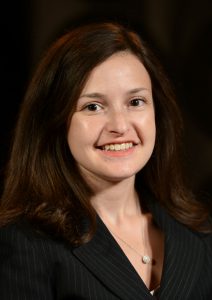Joelle Abramowitz is Co-Director of the Michigan RDC and an Assistant Research Scientist in the Survey Research Center, Institute for Social Research at the University of Michigan. She came to ISR in July 2016 after three years at the U.S. Census Bureau where she worked as an economist in the Health and Disability Statistics Branch of the Social, Economic and Housing Statis tics Division. Joelle received her Ph.D. in economics from the University of Washington in 2013.
tics Division. Joelle received her Ph.D. in economics from the University of Washington in 2013.
Recently, we asked Joelle how she became interested in her research. She told us: “I took my first economics class as a general requirement my freshman year of college, and when I saw the combination of exploring questions of how individuals and firms make decisions and a math basis, I knew I’d found what made sense to me.” She also told us a unique story about how her dissertation topic developed: “A friend of mine was in her mid-30s and really wanted to start a family, so she was doing online dating to find a spouse. She told me about a guy she was luke-warm about, and then told me about how she’d gone to her doctor and found out she could freeze her eggs. She concluded that while she could continue pursuing a relationship with this man, she had decided to move on to look for better options since she felt more confident about delaying trying to get pregnant. I wondered how many other women felt the same way, and that led me to the main topic of my dissertation, which was how state health insurance mandates that required employers to provide health insurance coverage for assisted reproductive technology affected women’s marriage and fertility timing.”
Joelle also followed another topic in her dissertation that arose from a point of personal interest: “The other topic of my dissertation examined the relationship between working longer hours and body mass index. That was somewhat autobiographical and came about as a way to quantify why I gained weight after I started my first job after college working long hours at a consulting firm.”
Joelle has done a fair amount of work looking at health insurance and medical expenditures. Recently, she examined the effects of the Affordable Care Act young adult provision on marriage and fertility and related outcomes, as well as the effects of the Affordable Care Act state Medicaid expansions on medical expenditures and crowding-out of private health insurance. Her work on marriage and fertility used the Census Bureau’s restricted-use American Community Survey data on survey response date to more precisely identify timing of marriage and fertility with respect to the policy change.
When we asked Joelle where she hoped to take her research in the future, she said: “Prior to joining ISR, my research had mostly focused on younger individuals, either young adults, women of childbearing age, or individuals under age 65, because these were the populations relevant to the policies I was studying. Going forward, I am eager to do more work focusing on older populations. I came to ISR to work on the CenHRS project, linking the Health and Retirement Study to Census Bureau administrative data on respondents’ employers. We’re getting closer to having data that is ready to be used for research, and that is exciting!”
In her free time, Joelle likes to cook, bake, bike, hike, and tango. She also mentioned that she has “the unusual (but not extremely useful) ability to hula hoop for long periods of time.”
